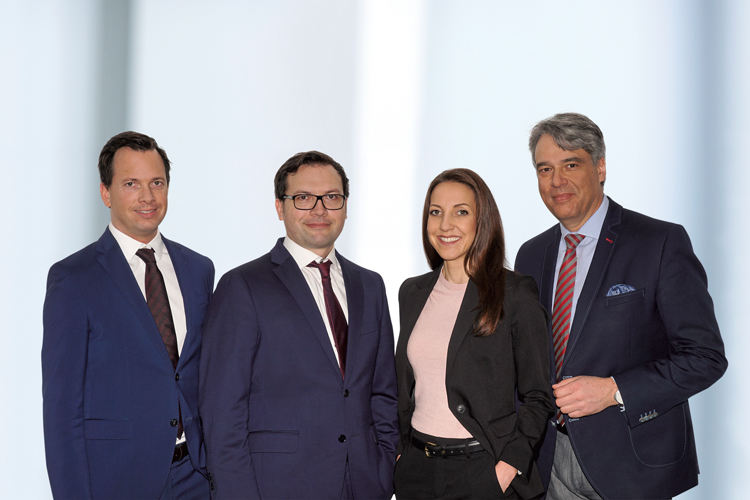What bad habits does the real estate industry need to kick?
All too often we hear and read about the amazing technologies that are going to revolutionise the working lives of property and asset managers. However, true innovation also means kicking some bad but cherished habits and moving out of the proverbial comfort zone. When it comes to the following issues, our four Managing Directors, Sabine Giesen-Kirchhofer, Michael Greis, Karsten Körper and Heiko Dietel, believe the time is now ripe for a rethink.
Giesen-Kirchhofer: We need to stop underestimating the human factor
In my opinion, one of the major problems right now is that the entire market is crying out for digitalisation. It is implied, at least by some within the industry, that revolutionary digital technologies will eliminate much of the work done by humans. This will not be the case. Every digital tool needs a human operator to make the best strategic decisions based on the insights provided by these new systems. This makes it all the more regrettable that, behind all the rhetoric surrounding digitalisation, some of the industry’s most pressing concerns, such as how to recruit and retain enough (young) specialists and managers, have dropped off the radar. To put it bluntly, we are spending too much time focussing on the potential benefits of future-oriented IT technologies and too little on the human factor. I also think that this is one of the reasons why so many people are secretly annoyed by the digitalisation debate. Across the industry, we need to be adapting our corporate cultures to truly promote the professional and personal development of our employees – rather than constantly poaching the best talent from other companies. The future of technological resources and the future of human resources should not be mutually exclusive, they should grow together.
Greis: We need to focus on being both more digital and more agile
We need to fundamentally question whether digitalisation will ever really deliver incredible efficiency gains. Many investors and corporations have their own system landscapes and data room applications. Rather than being fed into and processed by uniform interfaces, data have to be repeatedly prepared, processed and reproduced. We should therefore focus the lion’s share of our efforts on becoming more agile rather than just talking about digital issues. From both organisational and interpersonal perspectives, how can we create processes that are agile enough to respond to such a market? Employees with different specialisations need to be able to navigate various IT systems quickly and at the same time, as well as working efficiently as a team. This requires constant on the job training. However, this level of agility can only be achieved with state-of-the-art data acquisition and processing. The key factor is whether the necessary information is recorded, processed and made available quickly. This is the only way to identify optimisation potentials and profoundly increase efficiency. It may sound obvious, but how many companies rely on essential data preparation processes that are either too slow or inconsistent?
Körper: We need to question traditional hierarchies
Despite being so outmoded, a deeply-rooted fixation on the clear hierarchy between property manager, asset manager, investment manager, letting manager and fund manager remains widespread throughout our industry. In the past, property management, together with property accounting and master data maintenance, were frequently regarded as inferior to other disciplines. Quite apart from the question of esteem, this also created challenges in terms of efficiency. After all, hierarchies create pressure and make it more difficult for team members to exchange information smoothly. Good ideas can be held back – and emerging problems might not get anywhere near the attention they deserve until it is too late. In place of rigid hierarchies, we need a corporate culture that cultivates and encourages open communication. We need the best human interfaces and small teams. Only when these are in place can we hope to create a professional environment that facilitates constant personal communication between managers and employees.
Dietel: We need to let go of our obsession with the market cycle
“How long will the real estate boom last?” We have probably all been hearing and reading this question asked repeatedly for far too long now. Given the complexity of real estate markets today, it is almost impossible to provide forecasts that people can truly rely on. Instead of obsessing over what stage of the cycle we are currently in, we should pay greater attention to the status of individual real estate assets. How stable is the tenant structure? What positive or negative location factors are there? Is the operational model sustainable in the long term? Of course, market developments will always play a role – especially in A and B cities. That is why regional centres in particular, where markets are less crowded, are such a good fit for “cycle agnostic” investors. However, even in metropolitan areas, we should not allow ourselves to be driven crazy by market noise as we weigh up investment decisions. We need to look more closely than ever before at property-specific key data. That will tell us almost all we ever need to know.
The interviewees: Sabine Giesen-Kirchhofer, Michael Greis and Karsten Körper are Managing Directors of IC Property Management GmbH; Heiko Dietel is Managing Director of IC Asset Management GmbH.
